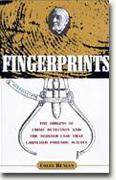Fingerprints
Colin Beavan
book reviews:
· general fiction
· chick lit/romance
· sci-fi/fantasy
· graphic novels
· nonfiction
· audio books
· author interviews
· children's books @
curledupkids.com
· DVD reviews @
curledupdvd.com
newsletter
win books
buy online
links
home
for authors
& publishers
for reviewers

 |
Fingerprints: The Origins of Crime Detection and the Murder Case That Launched Forensic Science Colin Beavan Hyperion Hardcover May 2001 232 pages |
|
In 1880, after sending letters to police chiefs around the world with no response, Henry Faulds, one of the chief pioneers of fingerprinting, wrote an article for the magazine Nature. No one seemed much interested in a procedure using "nearly microscopic lines on the tips of the fingers to identify criminals." No one, except maybe Mark Twain, who author Colin Beavan claims may have read it when he used the idea in his 1883 book Life on the Mississippi. Unfortunately for Faulds, not even his colleagues listened to him. He spent the rest of his life trying to gain notice for his part in the discovery of identification through fingerprints. Everyone wanted to take the credit. According to Beavan, Faulds and a few other pioneers were constantly "bitter at having been elbowed out of the limelight." Colin Beavan sets the record straight, giving much of the credit for how fingerprints are used today to Henry Faulds. But Fingerprints is not just about the clamor for recognition. Beavan takes a look at how Europe's entire criminal justice system changed in the 18th and 19th centuries. How it went from executing criminals for every offense (some of the gory details are not for the squeamish) to a reform of punishments with a systematic and realistic procedure for police to follow. Fingerprints reads much like a novel while introducing to the lay person many interesting facts about how fingerprints are used in capturing criminals. Beavan manages to pack quite a bit of information into this short volume, so it's highly recommended to fans of history, science and criminal justice. © 2001 by April L. Galt for Curled Up With a Good Book |
 Click here to learn more about this month's sponsor! |
|
| fiction · sf/f · comic books · nonfiction · audio newsletter · free book contest · buy books online review index · links · · authors & publishers reviewers |
|
| site by ELBO Computing Resources, Inc. | |
 0But as with any other scientific method, fingerprinting had to be proven. This was especially so with the police, the very same people who would be relying on it the most. The pioneers had a tough time convincing the police that a sweaty thumb impression could lead them to the person responsible for the crime. In fact, they had a hard time convincing anyone to listen.
0But as with any other scientific method, fingerprinting had to be proven. This was especially so with the police, the very same people who would be relying on it the most. The pioneers had a tough time convincing the police that a sweaty thumb impression could lead them to the person responsible for the crime. In fact, they had a hard time convincing anyone to listen.